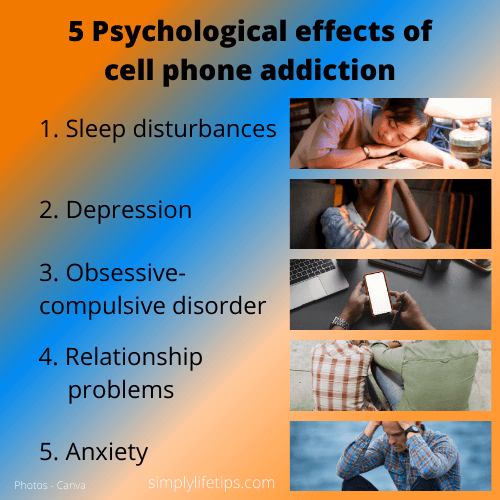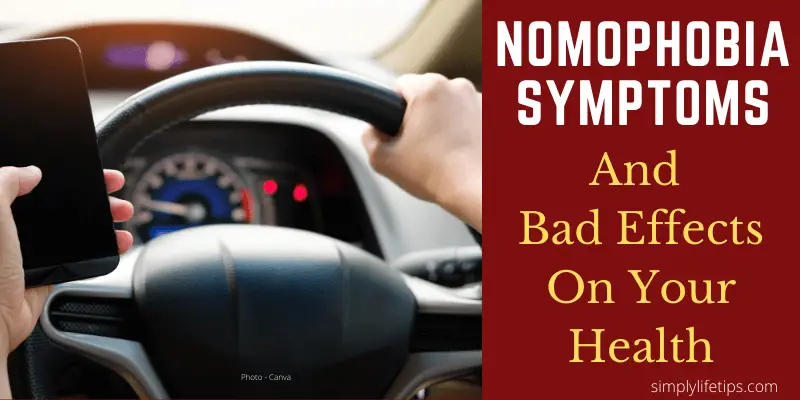Have you heard the term “Nomophobia”, an extreme fear of not having your phone or not being able to use it? How often do you use your smartphone for checking emails, social media notifications and chats? Do you feel anxious and stressed when you know you will lose internet service for a few hours? Do thoughts of being without your phone cause distress when misplaced or forgotten to carry with you? Do you have trouble putting down your smartphone for a few seconds or when missing in your pocket? If you have any of these symptoms, you should give proper attention, because there is a possibility that you have nomophobia.
This article is written by Augustin Joseph MA B Ed, Mount Assissi School (Senior Section), Bhagalpur, Bihar, India. Thanks to Augustin Joseph for this informative and useful article.

What Is Nomophobia?
The term NOMOPHOBIA or NO MObile PHone PhoBIA is used to describe a psychological condition when people have a fear of being detached from mobile phone connectivity. The term NOMOPHOBIA is constructed on definitions described in the DSM-IV, it has been labelled as a “phobia for a particular/specific things”.[3]
A Few Questions About Nomophobia
What are the symptoms of Nomophobia?
Any addiction will show many symptoms like anxiety, nausea, trembling, dizziness, depression, discomfort, fear, panic etc.
Is nomophobia common?
Today, many people are addicted to social media and other online entertainment and they waste their precious time. They fear they can’t live without a smartphone. So, we can say it is nomophobia is affecting many people.
What causes nomophobia?
A weak mind, low self-esteem, lack of self-confidence, fear of loneliness or isolation, lack of self-control and other reasons are the causes of nomophobia.
How do fix nomophobia?
Self-control, and self-improvement is the first and best thing to overcome addictions. If you experience significant distress or have a hard time managing your addiction problems, you must consult a therapist. He can surely help you with proper advice and medication, if necessary.
Do mobile phones cause anxiety or other mental health problems?
All addictions will affect your mental and physical health. Smartphone addiction will cause anxiety, stress, depression and other mental health problems. If you don’t overcome addictions, that will make you sick.
A story of a victim of Nomophobia
“Mom, you will have a surprising news on my sixteenth birthday, Be patient to watch it today at 8 p.m.” This was a Whatsapp message sent by a son to his mother who lives in a remote village in Bihar.
The mother tried to call him for wishing him a birthday but the phone was switched off. At last, she impatiently waited for the live show of her beloved son! She kept her phone beside her the whole day, lest she should forget it. At around 7:55 she received the long-awaited video call from her son. She came out running from the kitchen with the phone.
To her surprise; she could see her son in a shabby dress, depressed and gloomy with a dreadful smile. She watched him moving towards a knot, made with a bedsheet, that was hanging from the ceiling fan. Mother cried immediately “Please don’t do my son, you may do anything you want in your life. No one is going to scold you”.
She expected terror and she was right. Her cry echoed only within the four walls of her room. He kept moving and the next moment she saw her beloved son hanging from the fan and struggling for life. The phone fell down from her and then the fragile mother was unconscious.
The next day the hostel authorities found the door locked from within. Finding suspicion, they informed the police. The police came and broke open the door of his room and saw him hanging. The police got a note from the table in his room. The note read, “I do not want anyone to interfere in my life. I go to a world where no one is going to blame me for playing video games.“……
This story is a fabricated one, but very often we hear news of this sort.
Today we live in a world of texting, surfing, chatting and searching. We live in a world where a tiny electronic device controls our entire life and we honourably call it Smartphone. Today the interpersonal relationship is
regulated and dictated by the apps that can be installed and uninstalled.
Read Teenage Addictions | How To Deal With Your Children
Is your child going to be a victim of Nomophobia?
Where are we heading for? We claim we are born free and in the pretext of gaining freedom, freedom unbound, we become enslaved to a gadget that has no emotion, no heart to feel and no will to determine. It is not surprising to say that the first word of an infant of tomorrow would be ‘mobile’. We often add it to our credit when we see our little child playing games or texting on Whatsapp, “Mum, I am busy now, bring my dinner upstairs“. Alas! We fail to realise that our child is going to be a victim of Nomophobia.
According to Margaret Rouse, “Nomophobia is the irrational fear of being without your mobile phone or being unable to use your phone for some reasons such as the absence of a signal or running out of minutes or battery power”.
The word Nomophobia is a portmanterm made up of No +Mobile +Phone+ Phobia. The term was created by You Gov, A Research Organization based in the UK.
For most of us, a cell phone is an inevitable part of our life. Not only do we use it for information and building up relations but also for business, socio-cultural and religious needs. It has become rather a member of our family. But often we fail to realise that this device has no heart to love us or to feel for us. Thus we become gradually a victim of this snake in the grass.
It is said that Mental Health Experts haven’t yet decided on formal diagnostic criteria for this condition. Many are of the opinion that it’s a type of phobia, dependence or addiction.
According to the PEW Research centre, 67% of smartphone owners have admitted to checking their phone for calls or messages when their phone did not vibrate or ring. This is a major sign of cell phone dependence.
The other similar signs of addiction are the following:
- A need to use the cell phone more and more often in order to achieve the same desired effect.
- Preoccupation with smartphone use.
- Turns to a cell phone when experiencing unwanted feelings such as anxiety or depression.
- Excessive use is characterised by a loss of sense of time.
- Need for the best cell phone with more applications or increased use.
- Withdrawal symptoms like anger, tension, depression, irritability and restlessness.
5 Physical effects of cell phone addiction (Nomophobia)

Overuse of cell phones or Smartphones may result in a number of different physical problems that may cause permanent damage or be difficult to treat. The following are some of them.
1. Digital eye strain
It is the pain and discomfort associated with using a digital screen for over two hours. Eyes begin to burn and vision is Blurred. Eye fatigue and digital eye strain can cause a headache.
2. Neck problems
It’s also known as text neck which refers to neck pain resulting from Looking down at a cell phone or tablet for too long.
3. Increased illness due to gems
One in six cell phone has fecal matter on it. E-Coli bacteria, which can cause fever, vomiting and diarrhoea, is found on many phones. Phones are been found to be contaminated with MRSA( Methicillin-Resistant
Staphylococcus Aureus) which causes painful abscess, life-threatening infections in bones, joints, bloodstream, heart valve and lungs.
4. Car accident
Many people believe that they can multitask and use their phones while driving, but this causes significant impairment and puts the driver and others on the road in danger. Research has revealed that texting and driving can be just as dangerous as driving and drinking.
5. Male infertility
Preliminary studies have revealed that cell phone radiation may decrease sperm count, sperm motility and viability.
5 Psychological effects of cell phone addiction (Nomophobia)

Researchers have observed certain psychological effects due to excessive use of the smartphone. Some of them are the following:
1. Sleep disturbances
Cell phone addiction has been linked to an increase in sleep disorders and fatigue in users. Using your cell phone before bed increases the likelihood of Insomnia. Bright light may decrease sleep quality. Smartphone use could increase the amount of time you take to fall asleep. The light emitted from the cellphone may activate the brain.
Read Easy Ways To Get Better Sleep At Night
2. Depression
Depression is classified as a mood disorder. It may be described as feelings of sadness, loss, or anger that interfere with a person’s everyday activities. New research suggests a person’s reliance on his or her smartphone predicts greater loneliness and depressive symptoms, as opposed to the other way around.
Research in this field has identified a link between smartphone dependency and symptoms of depression and loneliness. However, it’s been unclear whether reliance on smartphones precedes those symptoms or the reverse is true: depressed or lonely people are more likely to become dependent on their phones. In a study of 346 adolescents, aged between 18-20, conducted on September 30 2019, by The University of Arizona, the researcher Matthew Lapierre and his collaborators found that smartphone dependency predicts higher reports of depressive symptoms and loneliness, rather than the other way around.
3. Obsessive-compulsive disorder (OCD)
It is caused by relentless usage of smartphones or simply smartphone addiction, which leads to sleeplessness, stress and anxiety. As executives and professionals spend more and more time on mobiles and tablets — checking and responding to emails and messages, socialising with clients and peers through tweets and social media networks, and checking out news and events — smartphone OCD is slowly turning into an epidemic.
4. Relationship problems
An offline relationship may suffer as a result of neglect in favour of excess cell phone and social media use.
5. Anxiety
Research has found that college students who use their cell phones the most are more likely to feel anxious during downtime.
Am I addicted To smartphones (Nomophobia)?
Following are some of the ways to assess whether one is addicted to the use of smartphones or not. Let us understand ourselves by asking the following questions
- Do I find myself spending more time on my Smartphone than I really need?
- Do I find myself mindlessly passing time on a regular basis by staring at my smartphone even though there might be better or more productive things to do?
- Do I seem to lose track of time when I am on my cell phone?
- Do I find myself spending more time texting, tweeting or E-mailing than talking to real-time people
- Has the amount of time I spent on my cell phone been increasing?
- Do I secretly wish I could be a little less wired or connected to my cell phone?
- Do I sleep with my Smartphone on or under my pillow or next to my bed regularly?
- Do I find myself viewing or answering texts, tweets and emails at all hours of the day and night, even when it means interrupting other things I am doing?
- Do I text, E-mail, tweet, or surf the internet while driving or doing other similar activities that require my focused attention and concentration?
- Do I feel my use of a cell phone actually decreases my productivity at times?
- Do I feel reluctant to be without my Smartphone even for a short time?
- When I leave home, do I always have my Smartphone with me and do I feel ill at ease or uncomfortable when I accidentally leave my Smartphone in a car or at home or if I have no service or it is broken?
- When I eat a meal, is my cell phone always part of the table place setting?
- Do I find myself mindlessly checking my phone many times a day even when I know there is nothing new or important to see?
If my answer to these questions is ‘YES’ to the majority of them, these may be symptoms of Nomophobia
Nerissa one of the prominent characters of the play, The Merchant of Venice, of William Shakespeare, says ‘they are as sick that surfeit with too much as that starve with nothing’. So excess of anything is bad.
What can you do to overcome Nomophobia?
- Let’s keep our cell phones at a distance.
- Let it not enter into your privacy and spoil the bond of relations.
- Let this gadget be a helping tool and not a cheating device.
- Let our children play on the ground feeling the rhythm of nature.
- Let them enjoy the feeling of social bonding and real friendship, not a virtual one.
- Let us make our dining tables, our creational halls and our family gathering free from the control of this device.
- Let us remember what Albert Einstein said years before the birth of this prodigal child, “The day when technology surpasses human interaction, the world will have a generation of idiots“.
Control the use of mobile phones and try to stay in the real world more than the virtual world. Try to re-establish the face-to-face connections and human-human interactions. Find 4 Excellent Habits To Beat Digital Distraction
Final Thoughts
You cannot escape from the force of technological advancement. It may be difficult for you to stop using smartphones, but you can surely limit your use of the mobile phone. Never waste your time and energy on unnecessary things. If you have any symptoms of nomophobia, realise your problem and take the necessary measures to overcome nomophobia and make your life successful with full of happiness.
Note:
This reflection is mainly based on the findings of the recent Research (mentioned below) made on the topic, hence they are liable to change in future.
References made
- PEW Research centre, Washington, D.C. Studies on Excess use of Smartphones
- You Gov, on ill effects of excess use of Smartphone
- Smartphone obsessive-compulsive disorder
Kindly share this article with your friends, relatives and on social media.
You are welcome to share your thoughts in the comment box below.

Mathukutty P. V. is the founder of Simply Life Tips. He is a Blogger, Content Writer, Influencer, and YouTuber. He is passionate about learning new skills. He is the Director of PokketCFO.
He lives with the notion of “SIMPLE LIVING, CREATIVE THINKING”. He Believes – “Sharing is caring.” and “Learning never ends.”




Amazingly written. Nice topic .